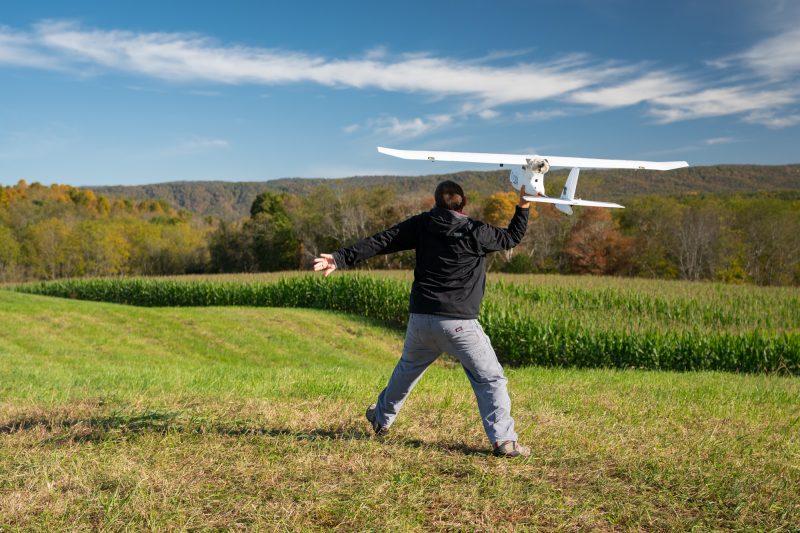Virginia Tech Mid-Atlantic Aviation Partnership (MAAP) has provided more detail about the Uncrewed Traffic Management (UTM) Field Test (UFT), a Federal Aviation Administration’s (FAA) research project announced earlier this month. MAAP was awarded the UFT task order with Lone Star UAS Center of Excellence and Innovation, Texas, to manage one of two FAA test sites for the UTM Field Test (UFT) project.
Additional partners include Airspace Link, ANRA Technologies, ATA, LLC, Collins Aerospace, OneSky, Raytheon Intelligence & Space, Streamline Designs, Virginia Dept of Aviation and Wing.
“These flight tests are critically important in the further development of UTM – the ability to take operational concepts and testing them in complex, ‘real-world’ environments,” said Mike Sanders, the executive director of the Texas test site. “We’re very pleased to be a part of the MAAP team and leverage our ongoing work in UTM to contribute to the depth and breadth of the testing environment.”
Safely managing drone traffic requires diverse sources of data routed through multiple software platforms. Each of these technologies is being developed by individual companies, with oversight and evaluation from the FAA through research programs such as this one. The composition of MAAP’s field test team reflects how complex this ecosystem is.
ANRA Technologies, Collins, and OneSky have all developed software platforms to schedule and deconflict drone operations. Wing, which has recently launched a residential drone delivery service in the Dallas metro area to complement its inaugural program in Christiansburg as part of its U.S. operations, is developing technology to enable the identification of nearby drones and evaluate other UTM software.
Airspace Link is integrating its AirHub Connect software into the ecosystem, publishing airspace constraint and advisory data into a federated UTM network, informing operators of dynamic conditions that could impact operation safety. These tests will continue the development and validation of UTM technology based on industry consensus standards.
In addition to traffic management capabilities, this project will also showcase data and message security capabilities, ensuring the safety and security of the data shared across the UTM ecosystem. As digital data is sent between drones, drone operators, and software platforms, these mechanisms must be in place to safeguard sensitive information and verify that participants are accurately representing their identity.
Supplementary data, such as airspace restrictions and information about local activities, will be fed into the UTM platforms by systems from Airspacelink and data science company ATA LLC. A Raytheon radar will supply weather data and monitor the area for crewed aircraft. Streamline Designs will provide a few of its aircraft as well as additional flight services that will allow the team to execute operations with a broader range of complexity.
“You need a diversity of participants in research like this to make sure that the comprehensive industry perspective is considered,” explained John Coggin, MAAP’s associate director, who has led each of the test site’s major traffic management research efforts. “It’s just like any other hard problem: You get the most useful result when you have as many stakeholders as possible providing input.”
Testing will unfold at four sites: Kentland Farms, a rural test facility outside Blacksburg where MAAP has often conducted complex research flights; suburban Christiansburg; and two sites in urban Corpus Christi.
Through an extensive series of test flights, the team will explore how to safely schedule and prioritize operations in environments where multiple operators may want to use the same airspace at the same time. The research will address questions about how to facilitate seamless interactions between software from different companies, how to prioritize critical public safety and medical flights, and how to responsibly provide access to information about a drone of interest and ensure that public safety officials can use that data for security and law enforcement.
Cybersecurity will be a unifying theme throughout this year’s tests. As digital signals travel back and forth between drones, drone operators, and software platforms, there must be mechanisms in place to safeguard sensitive information and verify that participants are accurately representing their identities.
Virginia Tech’s team also plans to evaluate frameworks for companies to work together to facilitate the rollout of drone traffic management services and test automated ways for new software to be validated — practical questions that must be hammered out before these systems can realistically be deployed on a broad scale.
The UTM Field Test is a successor to the FAA’s earlier UTM Pilot Program. MAAP was the only one of the seven test sites to be selected for both phases one and two of that program; the data and insights gained from their research has helped inform technology development and shaped subsequent testing efforts.
“We’re quickly getting to the point where traffic management is no longer a problem we can defer,” Coggin said. “We’re entering a transition from a state where we haven’t needed UTM to one where we definitely do need UTM. Research like this, that will help enable implementation in a way that’s evidence-based and prioritizes safety, is how we’re going to be able to navigate that big gray area between ‘don’t need’ and ‘must have.’”
(Image: Mark Blanks for Virginia Tech)
For more information visit:
www.maap.ictas.vt.edu




